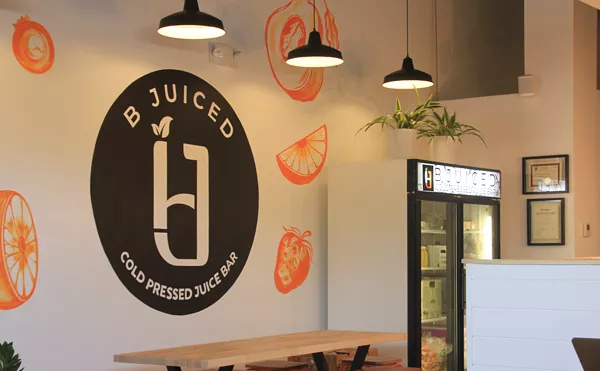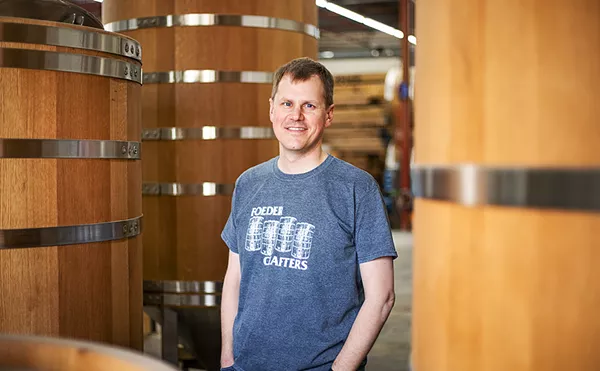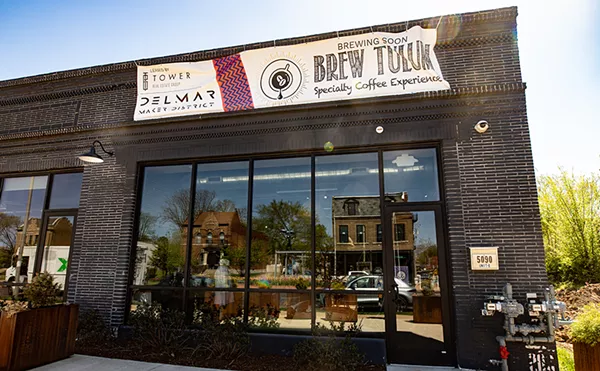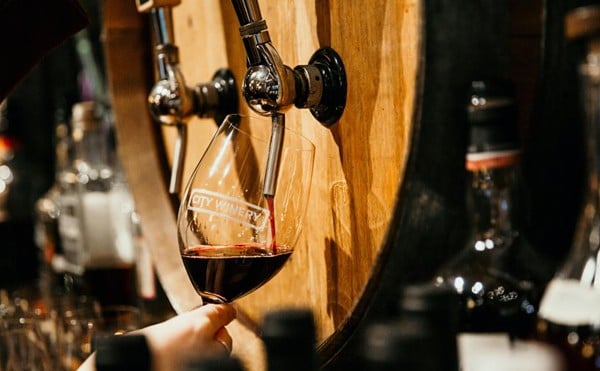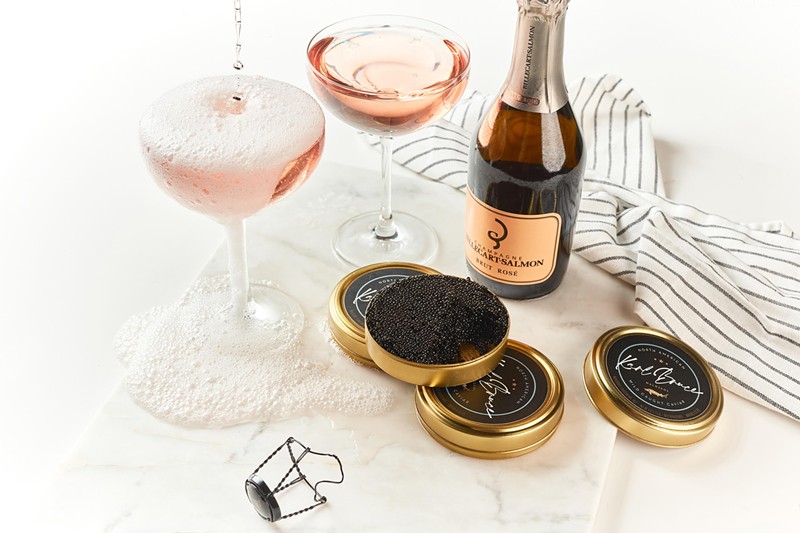
Courtesy Chris Cochran
Marginwise's Karl Bruce caviar is produced locally and sourced from the Midwest.
Chris Cochran insists that the origin story for St. Louis-based Karl Bruce caviar is not all that romantic. As the owners of the food consulting company, Marginwise, Cochran and his business partner, Mark Schepker, were looking at the portfolio of clients one day and both came to the same conclusion: They were missing a luxury brand. Since creating brands was a main focus of their consulting business, they decided to launch one of their own rather than waiting for an already existing one to approach them. Thinking of potential products readily available in the Midwest that might meet their requirements, they landed on caviar, found a world-class producer and dubbed their product Karl Bruce. It was a textbook brand development endeavor that would hopefully round out their portfolio.
However, when you dig a little deeper into Karl Bruce, you understand that its roots and importance go much deeper than Cochran's initial recounting. It's named after his father, who passed away as they were interviewing potential producers and tasting the caviars that would define their brand. It was natural that Bruce would be such a guiding force; a man who loved food, wine and travel, he instilled those passions in Cochran, who would go on to culinary school and work for some of the country's most renowned chefs such as Charlie Palmer and Alice Waters.
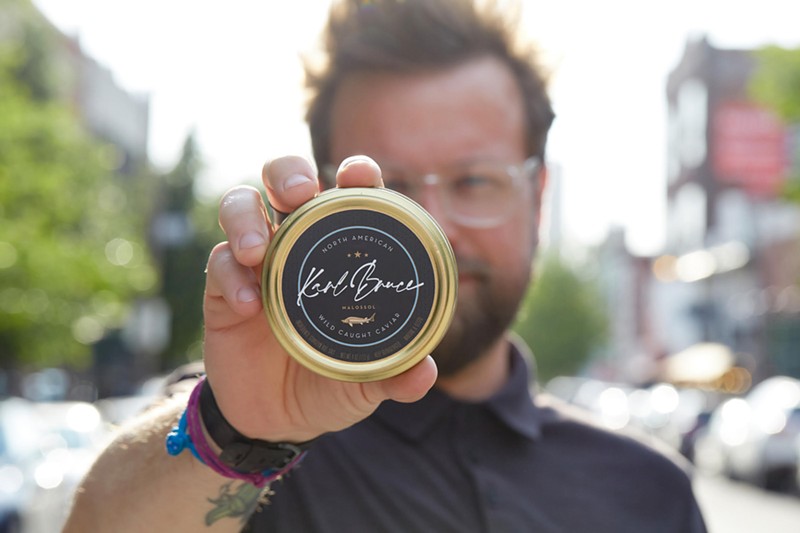
Courtesy Chris Cochran
Chris Cochran and Mark Schepker wanted to add a luxury brand to their food consulting company, Marginwise, so they decided to launch one themselves.
Though he left the kitchen to get into the consulting side of the business, Cochran never left his chef's mentality behind. Drawing upon his knowledge of caviar from his years in fine-dining, Cochran understood the art that goes into its production, as well as the fact that truly outstanding caviar is not limited to the traditional big-name labels with caviar coming from Iran and Russia.
"To be caviar, it has to come from sturgeon," Cochran explains. "From my fine-dining background, I knew there was sturgeon in the Mississippi River being harvested for caviar, so we started buying from as many producers as we could find to see who had the best product available. It's really a craft process. Even if it's the same fish, one producer's product may taste a lot different based on how it's processed. We found a producer who we firmly believe is making the best product in North America that is not farmed and figured we could build something that is beneficial to them and to us."
As Cochran explains, the majority of caviar that comes from Mississippi River sturgeon gets processed and shipped off in bulk, where it is rebranded, repackaged and shipped off in smaller increments. As a result of this model, the small producers get paid relatively low prices for their wares. By cutting out the middle man and working directly with Karl Bruce, these independent processors will make significantly more for their caviar.
Cochran notes that they deserve the higher cut. A labor-intensive endeavor, the process of making caviar involves removing the eggs from the fish, then cleaning them with a sieve. The goal is to get the eggs as clean and individualized as possible: The cleaner the eggs, the less salt that has to be used in preserving the caviar, which allows for a more nuanced taste.
Cochran is confident Karl Bruce is an outstanding product. But it's also attractive because it's a Midwest success story. Because most of it is caught in Illinois, and in some cases Iowa, it allows the money for the product to stay in the region, rather than in less geopolitically attractive areas.
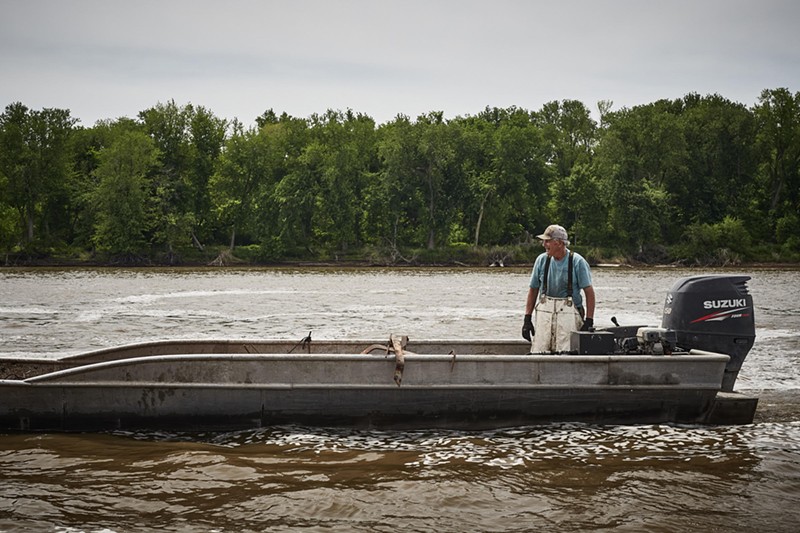
Courtesy Chris Cochran
By cutting out the middle man and working directly with Karl Bruce, these independent processors will make significantly more for their caviar.
"A lot of caviar is farmed in either Uruguay or Argentina, where they do not use the most sustainable practices ," Cochran says. "Also, outside of farmed caviar, the best places to buy caviar from are Iran and Russia, neither of which you particularly want to send your dollars to. This is 100 percent North American, so the dollars stay here and support local fisherman and processors."
As for the quality of the product, Cochran is confident that Karl Bruce stacks up well against other luxury caviar brands, and he's received a ringing endorsement that confirms his claim. Bulrush chef and owner Rob Connoley has been so impressed with his initial experience that he's continued to use it on his menu and has even agreed to provide a testimonial as to its quality.
For Cochran and Schepker, along with their partner Nate Litz, who only launched Karl Bruce a couple of week ago, that endorsement is confirmation that they have found a way celebrate the bounty of what's available in the Midwest beyond their expectations.
"This is really unique," Cochran says. "I've been in the food business for a long time, and this is really great product."
This story has been updated.


